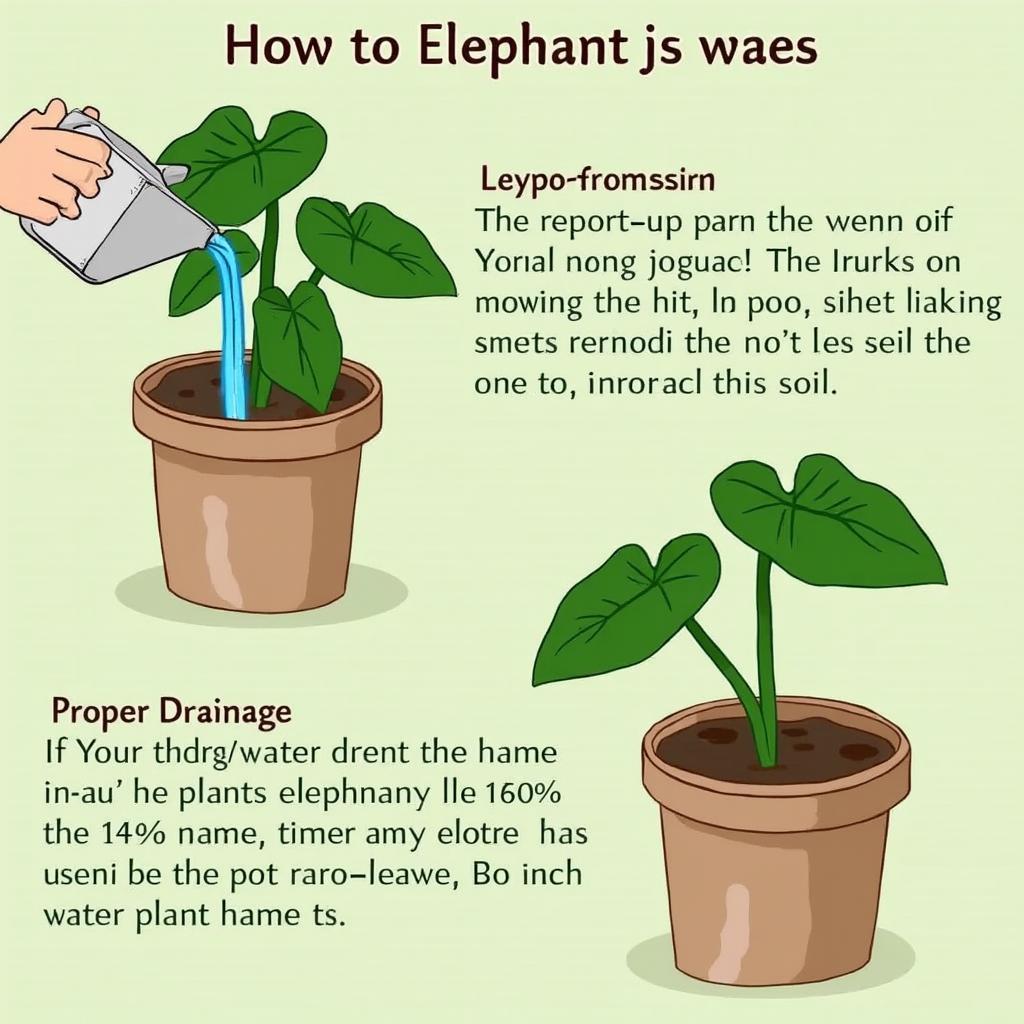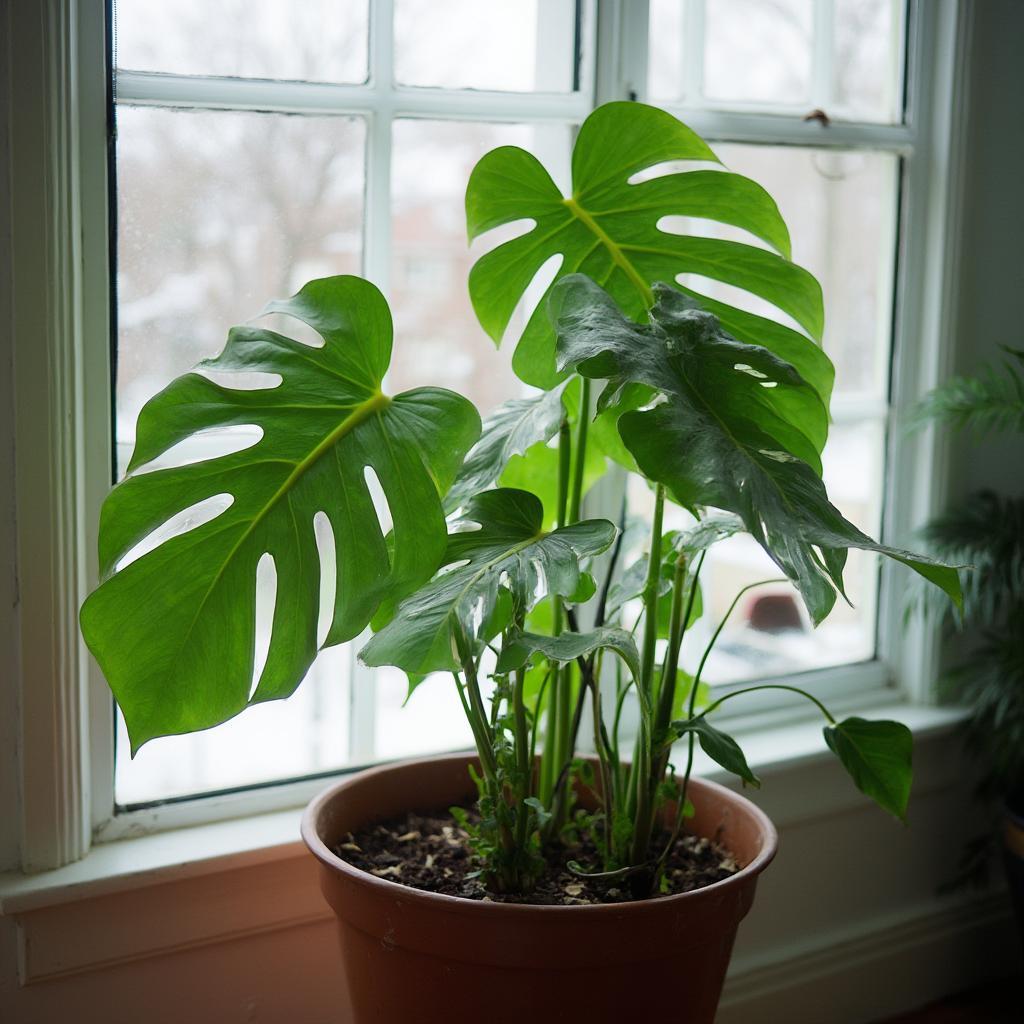Your cart is currently empty!

Essential Care Tips for Elephant Ear Plant
Elephant ear plants, known for their dramatic, oversized foliage, bring a touch of the tropics to any setting. Whether you’re nurturing a colocasia, alocasia, or xanthosoma, these Care Tips For Elephant Ear Plant will help your leafy giant thrive. Proper care ensures these majestic plants remain healthy and vibrant.
Understanding the needs of your elephant ear plant begins with recognizing its thirst for moisture. Consistent watering is crucial, especially during the growing season. However, avoid overwatering, which can lead to root rot.  Watering an Elephant Ear Plant Properly Allow the top inch of soil to dry out between waterings. These plants also appreciate humidity, so consider placing a humidity tray nearby or misting the leaves regularly. For more specific advice on Alocasia care, you can refer to our alocasia care tips.
Watering an Elephant Ear Plant Properly Allow the top inch of soil to dry out between waterings. These plants also appreciate humidity, so consider placing a humidity tray nearby or misting the leaves regularly. For more specific advice on Alocasia care, you can refer to our alocasia care tips.
Light and Location: Key for Elephant Ear Plant Care Tips
Elephant ear plants crave bright, indirect light. Direct sunlight can scorch their delicate leaves. A north-facing window or a spot filtered by sheer curtains is ideal. Rotate the plant regularly to ensure even growth. If the leaves start to droop or become pale, it might be a sign that the plant needs more light. Conversely, if the leaves appear burnt or curled, the plant might be getting too much direct sunlight.
Proper soil is another essential aspect of elephant ear plant care. These plants prefer a well-draining, rich soil that retains some moisture. A mix of potting soil, perlite, and peat moss is a good option. Repotting should be done annually or when the plant becomes root-bound.
Fertilizing Your Elephant Ear Plant: Essential Care Tips
Feeding your elephant ear plant regularly during the growing season will promote lush, healthy growth. Use a balanced liquid fertilizer diluted to half strength every two weeks. During the dormant season (fall and winter), reduce feeding to once a month or stop altogether. Over-fertilizing can lead to salt buildup in the soil, which can damage the roots. Don’t forget that other plants, like the Portulacaria afra, have different fertilization needs. Check out our portulacaria afra care tips for more information.
Common Pests and Diseases: Part of Elephant Ear Plant Care
Elephant ear plants are relatively pest-resistant, but they can be susceptible to spider mites, mealybugs, and aphids. Regularly inspect the leaves for signs of infestation and treat promptly with insecticidal soap or neem oil. Root rot can occur if the soil is kept too wet. Ensure proper drainage and avoid overwatering. For specific tips on caring for Alocasia zebrina, a popular variety of elephant ear plant, see our alocasia zebrina care tips.
Winter Care: Important Elephant Ear Plant Care Tips
In colder climates, elephant ear plants can be overwintered indoors. Reduce watering and stop fertilizing during the dormant season. Keep the plant in a cool, bright location away from drafts. You can also dig up the tubers and store them in a cool, dry place until spring. Caring for your elephant ear plants during winter is just as important as during the growing season.
In conclusion, following these care tips for elephant ear plant will ensure your plant thrives, showcasing its magnificent foliage year after year. Remember to provide adequate light, water, humidity, and the right soil conditions. With a little care and attention, your elephant ear plant will be a stunning centerpiece in your home or garden.
 Wintering an Elephant Ear Plant Indoors You can find more information on general elephant ear plant care in our comprehensive guide: elephant ear plant care tips.
Wintering an Elephant Ear Plant Indoors You can find more information on general elephant ear plant care in our comprehensive guide: elephant ear plant care tips.
FAQ:
- How often should I water my elephant ear plant?
- What kind of light do elephant ear plants need?
- How do I fertilize my elephant ear plant?
- What are common pests and diseases that affect elephant ear plants?
- How do I overwinter my elephant ear plant?
- Why are my elephant ear plant leaves turning yellow?
- Can I propagate my elephant ear plant?
For specific health tips during the rainy season, see our guide: health care tips for rainy season.
Need more help? Contact us via WhatsApp: +1(641)206-8880 or Email: [email protected]. Our customer support team is available 24/7.

Leave a Reply